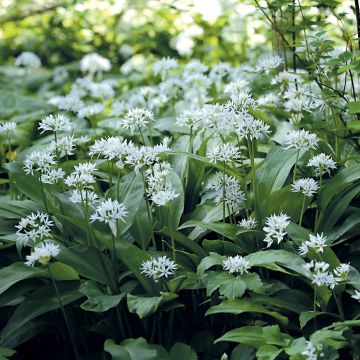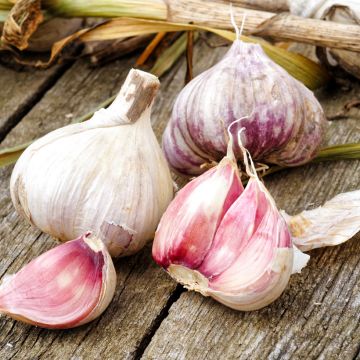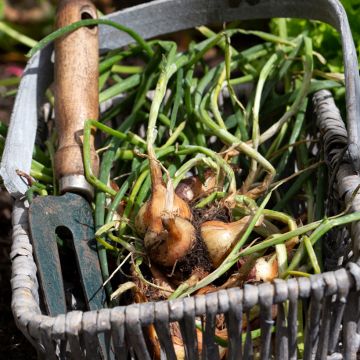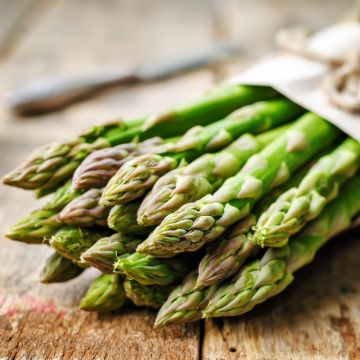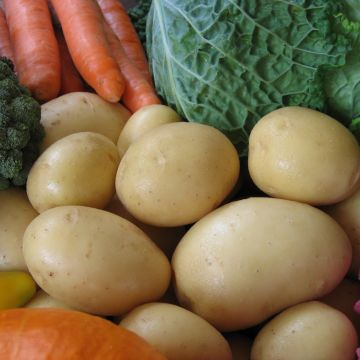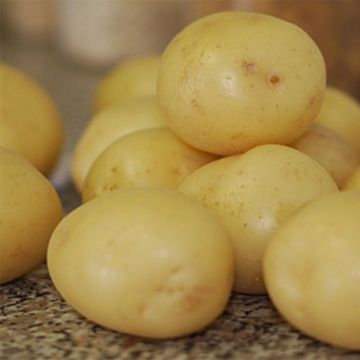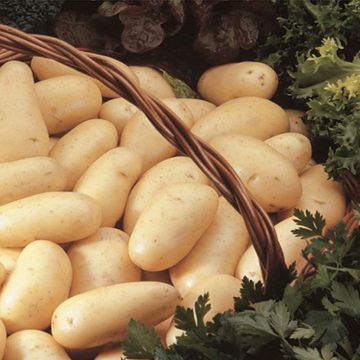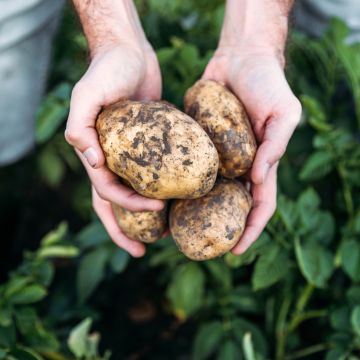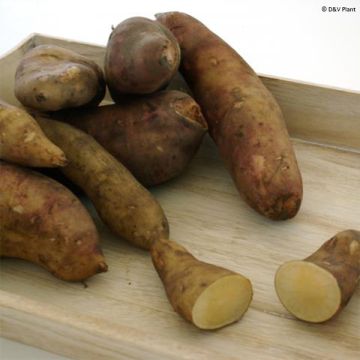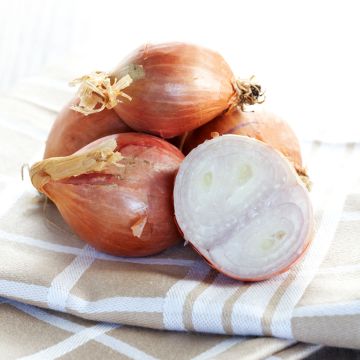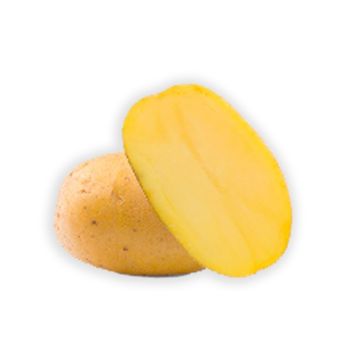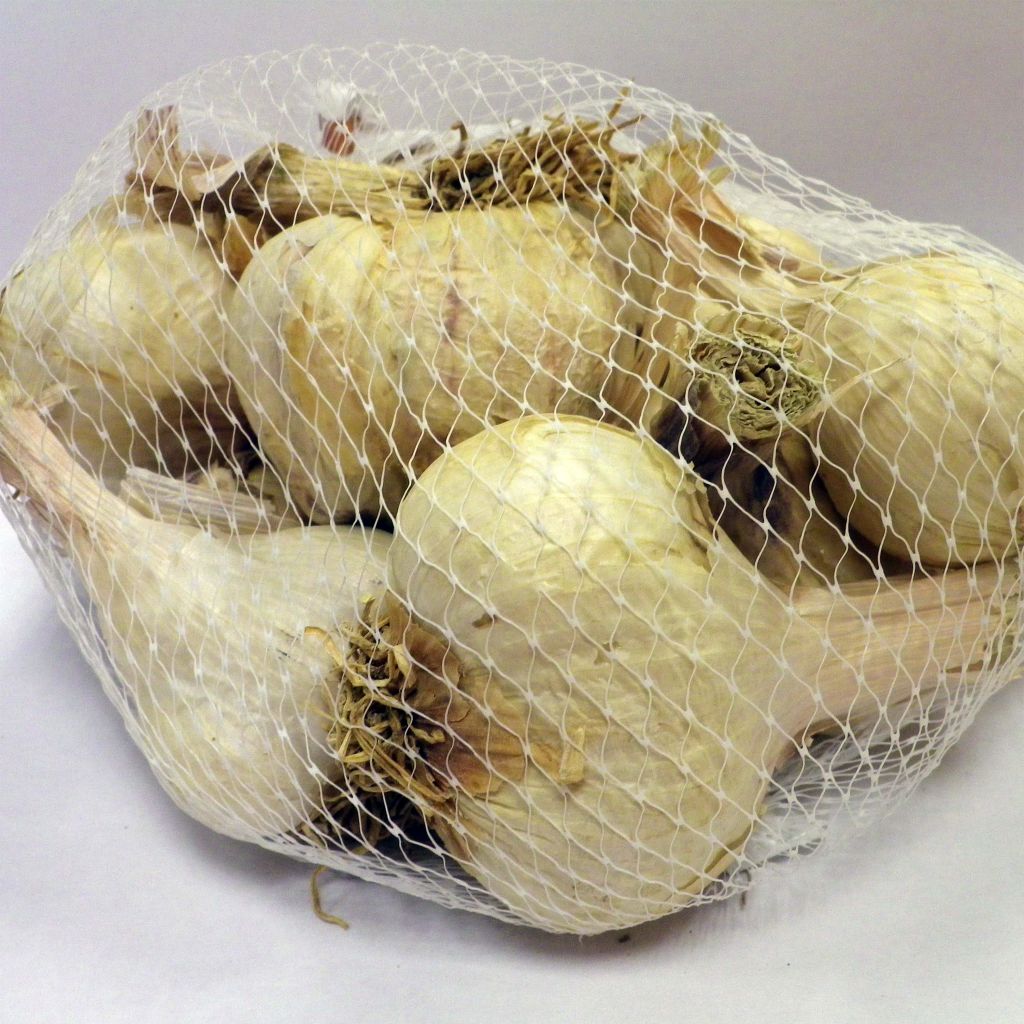

Germidour Garlic plants (autumn planting) - Allium sativum
Germidour Garlic plants (autumn planting) - Allium sativum
Allium sativum Germidour
Garlic
I received good quality plants on time, we'll see at harvest.
Jacques, 09/10/2022
This plant carries a 6 months recovery warranty
More information
We guarantee the quality of our plants for a full growing cycle, and will replace at our expense any plant that fails to recover under normal climatic and planting conditions.
From €5.90 for pickup delivery and €6.90 for home delivery
Express home delivery from €8.90.
From €5.90 for pickup delivery and €6.90 for home delivery
Express home delivery from €8.90.

Description
Violet 'Germidour' Garlic is a very early and productive autumn variety, offering pods with ivory-white flesh and pronounced aromas. It is a regenerated variety derived from 'Violet de Cadours', free of OYDV virus. In the vegetable garden, you will plant 'Germidour' garlic from September to December for a harvest in June - July.
Garlic is a very hardy perennial plant cultivated as an annual. It belongs to the Liliaceae family, like onions, shallots, and chives. It comes as a large bulb, called a head, topped with long, flat leaves. The garlic head contains several cloves. These cloves will be planted in the soil, giving birth to new garlic heads.
There are three categories of garlic: white, violet, and pink. White and violet garlic are planted in autumn. They are quite early and yield well, but their storage is limited. Conversely, pink garlic is planted in spring. It is well adapted to regions with harsh winters. Its productivity is less important, but it can be stored for a longer time.
In terms of cuisine, garlic can be consumed raw or cooked. Its strong taste flavours raw vegetables, meats, mushrooms, or stuffings. It is notably used in aioli and snail butter. Garlic has the particularity of being rich in sulfur compounds and selenium. Finely chopped, the leaves of white or violet garlic flavour omelettes and fresh cheeses, like chives.
Harvest: Garlic is harvested at maturity in June and July when the leaves wither. Dig up the bulbs and let them dry for a few days on dry and shaded soil (to avoid sunburn). The foliage of autumn garlic (white and violet) is harvested in April and May while still green.
Storage: Cut the stems or braid them to hang them. Store garlic away from light in a dry and relatively warm room, like the kitchen. Check beforehand that the bulbs have not been bruised to avoid rotting, which could contaminate the entire harvest. Garlic heads can be stored for several months (6 months to 1 year, with pink and violet garlic storing better than white garlic).
Gardener's tip: prepare a garlic spray to prevent seedling damping off and, as a curative measure, against mites and cryptogamic diseases (caused by fungi) such as mildew and rust. Soak 100g (about ten cloves) of crushed fresh garlic in 1L of rainwater and let it steep for 24 hours. Boil gently, covered, for 20 minutes. Let it cool (still covered) for 1 hour. Strain. Use undiluted:
- Either by watering or combatting seedling damping-off.
- Or by spraying on the foliage of plants (including the undersides of leaves) to combat cryptogamic diseases and mites. You can add a little milk to the mixture before spraying to allow better adherence to the foliage.
Repeat the operation three times with a 3-day interval. The garlic mix does not keep and must be used within 48 hours.
Report an error about the product description
Harvest
Plant habit
Foliage
Other Garlic Heads
Planting and care
Garlic appreciates well-drained, light soil without recent improvement (for at least one year). Plant it in a sunny location where you haven't grown vegetables from the same family (shallot, onion, and leek) in previous years. Garlic is sensitive to excess moisture, which can cause the bulbs to rot. If your soil is very wet, add sand and plant the garlic on mounds 10 to 15 cm (4 to 6in) high. This mound cultivation facilitates water drainage and also slightly increases the soil temperature.
Garlic can be planted in spring or autumn, depending on the variety:
- White and purple garlic should be planted from October to December in autumn.
- Pink garlic should be planted in spring, in February and March (or as early as January in mild climates).
Harvesting occurs in summer (June - July).
Dig furrows that are 3 to 4 cm (1 to 2in) deep, spaced 25 cm (10in) apart. Take the cloves from the outer part of the garlic head, as the ones in the centre are less productive. Plant them every 12 cm (5in), with the pointed end facing upward, and lightly bury them. Cover with a thin layer of soil (1 to 2 cm (0 to 1in), with the tip just above the ground). Watering is not necessary.
Hoe and weed, especially at the beginning of the cultivation. Only water in case of drought around May.
The garlic rotation period is five years. Avoid cultivating it next to leeks or onions, as they are susceptible to the same diseases.
Cultivation
Care
Intended location
-
, onOrder confirmed
Reply from on Promesse de fleurs
Bulbs, crowns, and tubers
Haven't found what you were looking for?
Hardiness is the lowest winter temperature a plant can endure without suffering serious damage or even dying. However, hardiness is affected by location (a sheltered area, such as a patio), protection (winter cover) and soil type (hardiness is improved by well-drained soil).

Photo Sharing Terms & Conditions
In order to encourage gardeners to interact and share their experiences, Promesse de fleurs offers various media enabling content to be uploaded onto its Site - in particular via the ‘Photo sharing’ module.
The User agrees to refrain from:
- Posting any content that is illegal, prejudicial, insulting, racist, inciteful to hatred, revisionist, contrary to public decency, that infringes on privacy or on the privacy rights of third parties, in particular the publicity rights of persons and goods, intellectual property rights, or the right to privacy.
- Submitting content on behalf of a third party;
- Impersonate the identity of a third party and/or publish any personal information about a third party;
In general, the User undertakes to refrain from any unethical behaviour.
All Content (in particular text, comments, files, images, photos, videos, creative works, etc.), which may be subject to property or intellectual property rights, image or other private rights, shall remain the property of the User, subject to the limited rights granted by the terms of the licence granted by Promesse de fleurs as stated below. Users are at liberty to publish or not to publish such Content on the Site, notably via the ‘Photo Sharing’ facility, and accept that this Content shall be made public and freely accessible, notably on the Internet.
Users further acknowledge, undertake to have ,and guarantee that they hold all necessary rights and permissions to publish such material on the Site, in particular with regard to the legislation in force pertaining to any privacy, property, intellectual property, image, or contractual rights, or rights of any other nature. By publishing such Content on the Site, Users acknowledge accepting full liability as publishers of the Content within the meaning of the law, and grant Promesse de fleurs, free of charge, an inclusive, worldwide licence for the said Content for the entire duration of its publication, including all reproduction, representation, up/downloading, displaying, performing, transmission, and storage rights.
Users also grant permission for their name to be linked to the Content and accept that this link may not always be made available.
By engaging in posting material, Users consent to their Content becoming automatically accessible on the Internet, in particular on other sites and/or blogs and/or web pages of the Promesse de fleurs site, including in particular social pages and the Promesse de fleurs catalogue.
Users may secure the removal of entrusted content free of charge by issuing a simple request via our contact form.
The flowering period indicated on our website applies to countries and regions located in USDA zone 8 (France, the United Kingdom, Ireland, the Netherlands, etc.)
It will vary according to where you live:
- In zones 9 to 10 (Italy, Spain, Greece, etc.), flowering will occur about 2 to 4 weeks earlier.
- In zones 6 to 7 (Germany, Poland, Slovenia, and lower mountainous regions), flowering will be delayed by 2 to 3 weeks.
- In zone 5 (Central Europe, Scandinavia), blooming will be delayed by 3 to 5 weeks.
In temperate climates, pruning of spring-flowering shrubs (forsythia, spireas, etc.) should be done just after flowering.
Pruning of summer-flowering shrubs (Indian Lilac, Perovskia, etc.) can be done in winter or spring.
In cold regions as well as with frost-sensitive plants, avoid pruning too early when severe frosts may still occur.
The planting period indicated on our website applies to countries and regions located in USDA zone 8 (France, United Kingdom, Ireland, Netherlands).
It will vary according to where you live:
- In Mediterranean zones (Marseille, Madrid, Milan, etc.), autumn and winter are the best planting periods.
- In continental zones (Strasbourg, Munich, Vienna, etc.), delay planting by 2 to 3 weeks in spring and bring it forward by 2 to 4 weeks in autumn.
- In mountainous regions (the Alps, Pyrenees, Carpathians, etc.), it is best to plant in late spring (May-June) or late summer (August-September).
The harvesting period indicated on our website applies to countries and regions in USDA zone 8 (France, England, Ireland, the Netherlands).
In colder areas (Scandinavia, Poland, Austria...) fruit and vegetable harvests are likely to be delayed by 3-4 weeks.
In warmer areas (Italy, Spain, Greece, etc.), harvesting will probably take place earlier, depending on weather conditions.
The sowing periods indicated on our website apply to countries and regions within USDA Zone 8 (France, UK, Ireland, Netherlands).
In colder areas (Scandinavia, Poland, Austria...), delay any outdoor sowing by 3-4 weeks, or sow under glass.
In warmer climes (Italy, Spain, Greece, etc.), bring outdoor sowing forward by a few weeks.

































